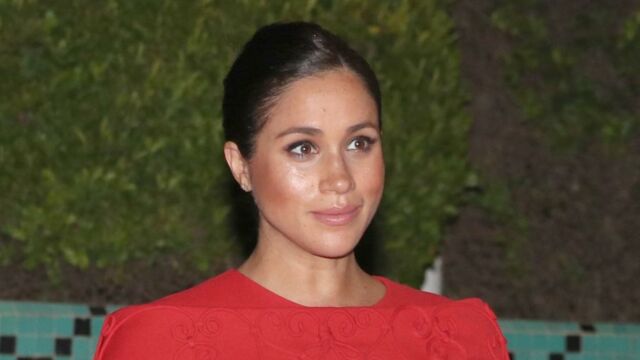Books written about the Royal Family are often big events. For instance, just a few months ago, in November 2023, when Omid Scobie published Endgame, so-called revelations in the book made headlines.
Discover our latest podcast
Now, the new year is starting just like the last one ended: with a dramatic royal book. This time, the book is penned by Robert Hardman who, over the years, has published numerous unauthorised biographies. On top of this, Hardman is one of the Daily Mail’s royal columnists.
As such, extracts from his new book are being serialised by the Mail and needless to say the rest of the British tabloids are loving it. The ‘revelation’ which has the most people talking is about Prince Harry and Meghan Markle’s daughter: Princess Lilibet. Indeed, Hardman alleges that the Queen never gave her authorisation for the name to be used by the couple.
Princess Lilibet’s name supposedly made the Queen angry
This is the story that has been making headlines since Sunday 14 January. According to Hardman’s book, a palace source says that the Sussexes never ‘sought permission’ from the Queen to use her childhood nickname.
One privately recalled that Elizabeth II had been 'as angry as I'd ever seen her' in 2021 after the Sussexes announced that she had given them her blessing to call their baby daughter 'Lilibet'
Moreover, the book continues to explain that the Queen was angry at the Sussexes for insisting that she had given them authorisation. The couple has always claimed that they had spoken to the family first and that the Queen was ‘the first family member’ to know. The Sussexes' spokesperson also said that 'had she (the Queen) not been supportive they would not have used the name.' In the same statement, permission isn't mentioned choosing to say that 'he (Prince Harry) shared their hope of naming their daughter Lilibet'.
These claims vary from the ones made in 2021 and 2022
As the focus is currently on Robert Hardman’s book and as the Duke and Duchess of Sussex continue to attract the ire of the British media, some are pointing out an important detail.
Omid Scobie as well as Tiktok royal watcher @matta_of_fact are highlighting the fact that the Daily Mail in November 2022 published an article titled ‘The Queen took Harry and Meghan calling their daughter Lilibet as the 'compliment it was intended to be', new book claims’.
In the article the Mail outlined how Gyles Brandreth’s book explains that ‘while it is said that some members of the Royal Family were less than impressed with the couple choosing to use the moniker,’ Queen Elizabeth ‘took it as the 'compliment it was intended to be'.
The publication also highlights the credibility of Gyles Brandreth as ‘one of the few authors to have met and talked’ with Queen Elizabeth.
Moreover, the same publication published in 2021 an article titled ‘Harry wanted to name daughter after the Queen even before he met Meghan – and had discussed the idea with his grandmother, insider says’.
In the article, the Mail explains that though ‘it was unclear whether the Queen had been made aware’ when Lilibet was born, ‘insiders say Prince Harry discussed honouring his grandmother when he named his child years before he met his future wife’. The claims came from Mirror who spoke to ‘sources’ who claim that though the Sussexes didn’t ask permission, the Queen was well aware and not angry.
Did Prince Harry and Meghan have to ask for permission?
Taking a name from a family member is a custom that goes beyond the Royal Family. As the debate around whether or not the Sussexes asked for permission is going wild, a bigger question surfaces: did they really need permission?
According to Dr Shola Mos-Shogbamimu, they didn’t. The lawyer, political and women's rights activist has explained why on both X and the Jeremy Vine Show.
On X, she wrote:
1. Harry and Meghan did NOT need ANYONES’s permission least of all, Queen Elizabeth, to name their child Lilibet. The fact they got her blessing was out of respect not ‘necessity’.
2. The name Lilibet predates Queen Elizabeth for goodness sake - she didn’t own it or create it!
3. What grandmother in her right mind would be ‘angry’ at a great-grandchild being named to honour her?!
On the Jeremy Vine showshe called this conversation ‘utterly ridiculous’ and asks another important question: why is the British media so quick to believe claims by Hardman and brand Prince Harry and Meghan as liars?
She says:
Where is the credibility of this person?
She also highlighted that even at the time of Princess Lilibet’s birth, reports were conflicting with some stating the Queen was happy and others saying she wasn’t.
Finally, some royal watchers and members of the public are also criticising Hardman’s book for rehashing details about Queen Elizabeth’s death as well as painting her in an unflattering light. One X user summarises the situation this way:
We are being asked to believe that the Queen was a petty and spiteful woman, who resented her own great-granddaughter. Come on.
What do you think if the controversy surrounding Princess Lilibet’s name?
Read more:
⋙ This psychic predicted King Charles’ health scare: What else does she see for the Royal Family?
⋙ Royal Family: New poll reveals its popularity is at a historical low but that’s not the whole truth
Sources:
Daily Mail: Queen's fury over naming of baby Lilibet: Aide says monarch was 'as angry as I'd ever seen her' after Harry and Meghan claimed they had her blessing to use childhood nickname
Tatler: From the battle of the Lilibets to Charles’ reticence towards regency, Robert Hardman’s new book runs over with royal revelations
The Sun: Queen ‘as angry as I’d ever seen her’ aide says, after Harry & Meghan claimed they had her blessing to name baby Lilibet
Daily Mail: The Queen took Harry and Meghan calling their daughter Lilibet as the 'compliment it was intended to be', new book claims
Daily Mail: Harry wanted to name daughter after the Queen even before he met Meghan – and had discussed the idea with his grandmother, insider says
Mirror: Harry did tell Queen of wish to name daughter after her - but he didn't ask permission















